OWLs provide welcome nest for re-entry students
Students who are 25 and up find common cause as Berkeley's Older Wiser Learners
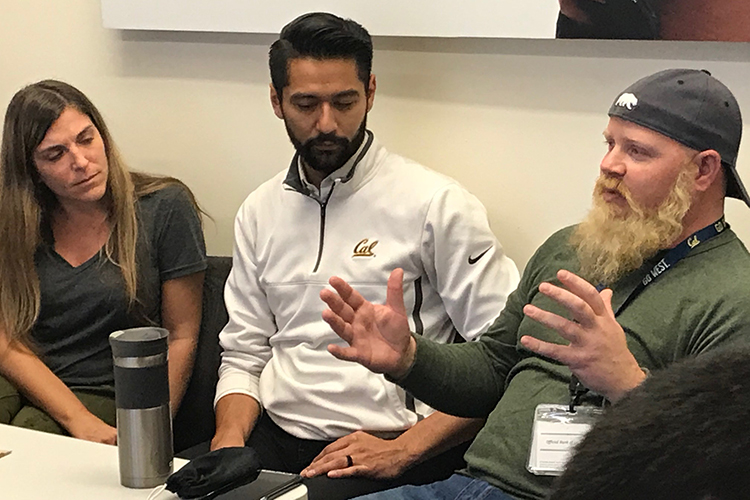
December 8, 2017
UC Berkeley undergraduates Kelly Richeson and Gina Niceforo are proud to be Bears. But the 56-year-old retired Ventura County firefighter and the 37-year-old former South Lake Tahoe waitress are equally glad to be OWLs.
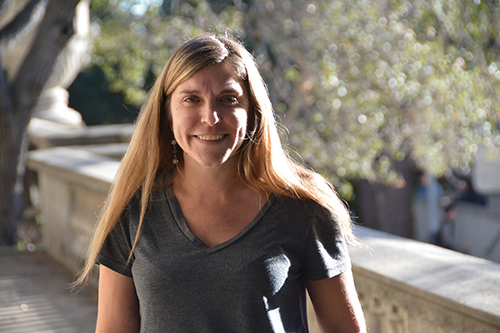
Political science major Gina Niceforo, 37, is OWLs’ leader. (UC Berkeley photo by Hulda Nelson)
They’re members of Older Wiser Learners (OWLs), a support group on campus that’s gaining popularity with Berkeley’s 1,660-plus undergraduate re-entry students, who are defined as age 25 and older and having had at least a five-year absence from college. Of those students, most — about 1,375 — are between 25 and 34. The oldest is 75.
“We often don’t feel part of the university, which is built for kids out of high school, to help them develop and find a career; we’re a community outside the norm,” says Richeson, an English major in his first semester at Berkeley. “That said, Cal goes out of its way to make us feel welcome, and when I started going to OWLs, I found I wasn’t alone.”
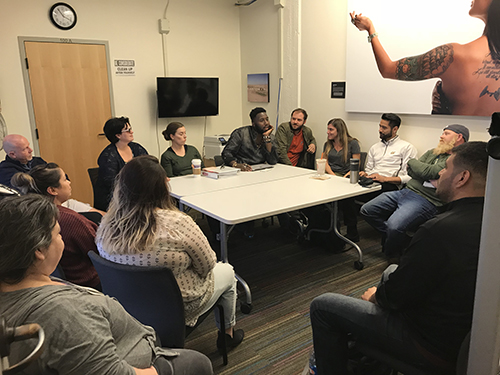
The OWLs meet in Hearst Gym’s Room 100 twice a week and welcome new members. (UC Berkeley photo by Gretchen Kell)
Twice a week in Room 100 of Hearst Gym, Niceforo, OWLs’ current student leader, hosts lively discussions with small groups of non-traditional students on topics that include balancing work, family and school, finding affordable housing, preparing for one’s first major exam in years — or even decades — and navigating a “generational disconnect” with younger classmates.
Berkeley’s re-entry students run the gamut, she says, including “those with children and partners, people who have worked for years and want to change careers, and formerly incarcerated and even formerly homeless people who are turning their lives around.”
What these older students value about OWLs, Niceforo says, is “support, and to hear first-hand experiences from other students who understand, who get it more than anyone, more than even academic counselors, really.”
But the group’s goal isn’t to create an isolated cohort of people who only want to hang out with each other, says Ron Williams, Berkeley’s director of Re-entry Student and Veteran Services. “Instead,” he adds, “OWLs build a sense of community and connection to Berkeley, a genuine feeling of knowing that this campus is their place.”
Overcoming intimidation
Richeson, who took an early retirement from firefighting in 2004 for health reasons and then worked as a suit salesman at Nordstrom, found himself missing school. In 2013, he entered two-year Pierce College in Los Angeles, where he earned straight As.
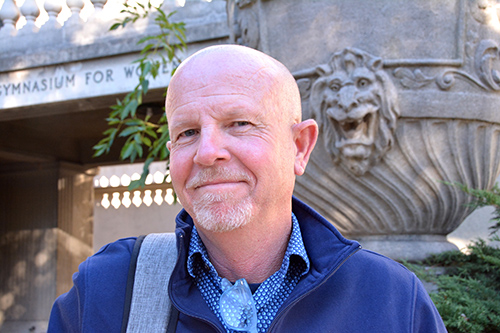
Kelly Richeson, 56, is a new undergraduate on campus this fall. (UC Berkeley photo by Hulda Nelson)
“I wanted a degree, I love to write, and I was in a UCLA honors transfer program,” he says. “But I also got accepted to Berkeley. I drove up and went on a student-led tour, and that cemented it — especially seeing the Nobel laureate parking spots. This place felt intellectual to me. By 9 a.m., I’d already bought a Cal cap.”
As a new student at Berkeley this fall, however, “I was intimidated by how smart these kids are — these are really, really bright students just out of high school. It was a wake-up call,” he says. “And I’ve had to work really, really hard. I’ve also been challenged by faculty who dropped my jaw on many occasions.”
At his first midterm, Richeson was mistaken for one of the older people auditing the class, and “that whole experience made me feel I wasn’t part of the student body,” he admitted. “I was honestly depressed for a while.”
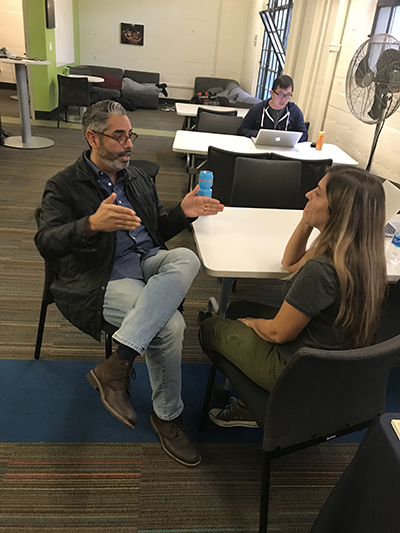
Ron Williams, director of Re-entry Student and Veteran Services, chats with Niceforo after a recent OWLs meeting. (UC Berkeley photo by Gretchen Kell)
Niceforo, a political science major planning to get a master’s in higher education, acknowledges feeling the same way when walking across bustling Sproul Plaza, where younger students typically pass out flyers and coupons only to those their age.
Richeson also is concerned about ageism when he applies for the doctoral program he badly wants to enter after earning his B.A.
“Overall, I was terrified earlier this semester, like anybody else in my position as a first year. But now I’m doing better than I expected,” he says. “If it hadn’t been for OWLs, things would be much worse. Just interacting with other students your age and finding common ground in your fears helps. “
Popular in class
What also helps are professors who voice their appreciation for what re-entry students offer in class, and how they often are the first to ask questions, share anecdotes and take advantage of faculty office hours.
“There are two things I admire most: their maturity — more life experience — and their commitment, which comes from not having had or not having taken the opportunity (to get a college degree) the first time around. So, they genuinely value it now,” says Michael Shalev, a Berkeley political science professor.
“When you take a break, perhaps a long one, from being a student,” he adds, “you have real advantages over the kids who take the conventional route. You’re wiser and more focused.”
After high school, Niceforo moved to the Sierra and enjoyed 15 years of snowboarding and waiting tables, then “definitely wanted more.” After attending Lake Tahoe Community College, she transferred to Berkeley in fall 2015, but soon developed “imposter syndrome,” a false belief that one’s successes are due to luck or fraud, rather than skill.
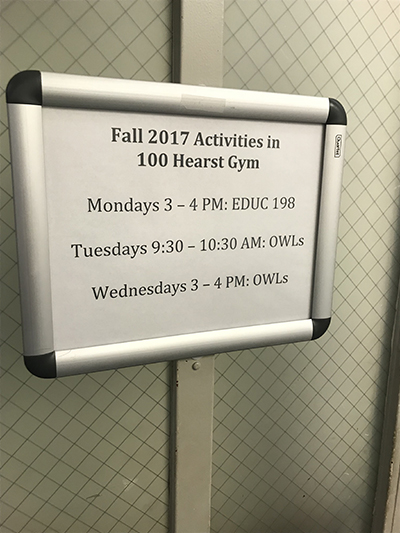
OWLs is open to all Berkeley re-entry students. (UC Berkeley photo by Gretchen Kell)
“You perceive you’re not smart enough to be here,” she explains. “You can’t believe you got in.”
She also wasn’t prepared for a student body that was less diverse, in terms of age, than at community college, and felt like “the only old person in school” and judged by her younger peers. She turned to Williams for advice.
“Ron said, ‘You’re saying this now, but in two months, you won’t be able to get (younger students) away from you. They’ll want you as a mentor, will look up to you and want you and your knowledge around.’ Nothing needed to change except my perception of myself,” says Niceforo, who today does outreach to future OWLs — community college students hoping to transfer to a four-year school.
“The reason she was getting looks from younger students is that they were thinking, ‘Why can’t I answer that question like her? Maybe she’ll be in a study group with me,’” confirms Wiliams. “But she was interpreting that as criticism.”
“Once we get more comfortable with ourselves, and OWLs helps with that,” adds Niceforo, “it allows younger students to approach us and for us to build unexpected friendships.”